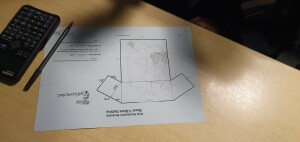Curriculum
Maths

"Do not worry about your difficulties in Mathematics. I can assure you mine are still greater." - Albert Einstein
Today's students will live and work in the twenty-first century, in an era dominated by computers, by world-wide communication and by a global economy. Jobs that contribute to this economy will require workers who are prepared to absorb new ideas, to perceive patterns and to solve unconventional problems. Mathematics is a key requirement for these jobs.
Through mathematics, we learn to make sense of things around us. As technology has mathematicised the workplace and statistics are key in any debate, the mathematical sciences have moved from being a requirement not only for future scientists but an essential ingredient in the education of all.
Year 9 Students have 6 lessons a fortnight, Year 10 and 11 students have 4 lessons a week
Summary of table of assessment
Paper 1 *Paper code: 1MA1/1F or 1MA1/1H
● Externally assessed
● Availability: May/June and November**
● First assessment: May/June 2017
33.33% of the total GCSE
Overview of content
1. Number
2. Algebra
3. Ratio, proportion and rates of change
4. Geometry and measures
5. Probability
6. Statistics
Overview of assessment
● Written examination papers with a range of question types
● No calculator is allowed
● 1 hour and 30 minutes (both Foundation and Higher tier papers)
● 80 marks available
The sample assessment materials can be found in the Pearson Edexcel Level 1/Level 2 GCSE (9–1) in Mathematics Sample Assessment Materials document.
*See Appendix 2: Codes for a description of this code and all other codes relevant to this qualification.
**See the November resits section for restrictions on November entry.
Pearson Edexcel Level 1/Level 2 GCSE (9–1) in Mathematics Specification – Issue 2 – June 2015 © Pearson Education Limited 2015 22
Paper 2 *Paper code: 1MA1/2F or 1MA1/2H
● Externally assessed
● Availability: May/June and November**
● First assessment: May/June 2017
33.33% of the total GCSE
Overview of content
1. Number
2. Algebra
3. Ratio, proportion and rates of change
4. Geometry and measures
5. Probability
6. Statistics
Overview of assessment
● Written examination papers with a range of question types
● Calculator allowed
● 1 hour and 30 minutes (both Foundation and Higher tier papers)
● 80 marks available
*See Appendix 2: Codes for a description of this code and all other codes relevant to this qualification.
**See the November resits section for restrictions on November entry.
Pearson Edexcel Level 1/Level 2 GCSE (9 - 1) in Mathematics Specification – Issue 2 – June 2015 © Pearson Education Limited 2015 23
Paper 3 *Paper code: 1MA1/3F or 1MA1/3H
● Externally assessed
● Availability: May/June and November**
● First assessment: May/June 2017
33.33% of the total GCSE
Overview of content
1. Number
2. Algebra
3. Ratio, proportion and rates of change
4. Geometry and measures
5. Probability
6. Statistics
Overview of assessment
● Written examination papers with a range of question types
● Calculator allowed
● 1 hour and 30 minutes (both Foundation and Higher tier papers)
● 80 marks available
*See Appendix 2: Codes for a description of this code and all other codes relevant to this qualification.
**See the November resits section for restrictions on November entry.
Outside the classroom
At Hendon School we offer a wide variety of extra-curricular activities, with every year group having access to maths trips and/or guest speakers at least once a year.
Students are also able to access a range of opportunities including the Mathematics in action lectures held every year at Imperial University, Finance and Mathematical Summer schools at a range of Universities. The enrichment element to the mathematics teaching at Hendon incorporates exploration and development of deep thinking skills for all students. Gifted and Talented groups, STEM sessions and the UK Maths Challenge form part of the ‘in-house’ training.
Progression pathways and careers
GCSE Maths could lead on to further study in subjects such as Maths, Further Maths and the Social Sciences.
Thanks to the growing importance placed on technology, big data and economic efficiency, by all kinds of organisations, expert number crunchers are increasingly in demand. Those who study maths are keen problem solvers, eager to make sense of even the most advanced equations. Academic research is a common career path, but so too are careers in business, economics, accounting and banking. This wide range of opportunities comes from the universal need for graduates with strong analytical and problem-solving skills – which math graduates should have by the bucket load.
Useful links
MyMaths
An interactive online lesson and test for every topic taught in secondary school mathematics. Pupils get their own logins and their performance in the topic tests (online homeworks) are recorded so progress can be monitored. The online lessons are very good with nice animations showing topics that are difficult to teach using just a whiteboard, such as, constructions and 3D coordinates. Username: hendon password: divide
Mathematics Enhancement Programme
A resource for every topic! Pupil text books, practice books, tests and much more on every topic through the primary, secondary and A-level curricula.
NRich Maths
A range of puzzles and activities for all abilities. The monthly puzzles really engage pupils as they can submit their solutions through the website and get them published online the following month.
Mr Barton Maths
Fantastic resources for mathematicians of all abilities
Hegarty maths
Award winning teacher, who has produced a number of videos and activities to help students in a range of topics
Contact
Mr E Roman, Head of Mathematics, romane@hendonschool.co.uk
